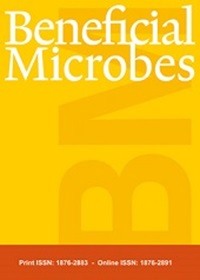A probiotic amylase blend reduces gastrointestinal symptoms in a randomised clinical study
IF 3
4区 医学
Q2 MICROBIOLOGY
引用次数: 0
Abstract
Abstract A randomised, placebo-controlled, double-blind, parallel clinical study was performed to examine the effects of a probiotic- amylase (PRO) blend on gastrointestinal (GI) symptoms. Sixty men and women (44.4 ± 8.9 yr; 82.0 ± 18.4 kg; 170.3 ± 11.5 cm; 28.1 ± 4.6 kg/m 2 ) were randomised into PRO (n = 29) or placebo (PLA: n = 31) groups. Participants exhibited mild to moderate GI symptoms and severity [via Gastrointestinal Symptom Rating Scale (GSRS)] to be eligible for participation. Participants were tested before (Baseline) and after (POST) 6 weeks of supplementation on various gastrointestinal indices, the GSRS (to assess GI symptoms, frequency, and severity), an anxiety questionnaire (GAD-7), and an overall well-being questionnaire (SF-36). Two (PRO vs PLA) × 2 (Baseline vs POST) mixed factorial ANOVAs were completed to assess group, time, and (group × time) interaction effects. Fifty-two subjects who completed the entire study were analysed (PRO: n = 25, PLA: n = 27). There were statistically significant ( ) interactions for bloating, GSRS score, and abdominal discomfort but time effects for flatulence, constipation, stool regularity, and GAD-7 total score. PRO significantly reduced GSRS score (∼60 vs 25%, d = 0.72), bloating (∼49% vs 25%, d = −0.63) and abdominal discomfort (59% vs 32%, d = −0.66) to a greater degree than PLA. PRO significantly reduced subjective feelings of irritability, pain, and overall health interference. Oral supplementation of the probiotic-amylase blend was very well tolerated. Our study showed that the probiotic-amylase blend reduced the GSRS score and other GI symptoms to a greater degree than PLA. Clinical trial registration: clinicaltrials.gov #NCT05614726在一项随机临床研究中,一种益生菌淀粉酶混合物可减轻胃肠道症状
摘要:一项随机、安慰剂对照、双盲、平行临床研究旨在研究益生菌-淀粉酶(PRO)混合物对胃肠道(GI)症状的影响。男女60名(44.4±8.9岁);82.0±18.4 kg;170.3±11.5 cm;28.1±4.6 kg/ m2)随机分为PRO组(n = 29)和安慰剂组(PLA: n = 31)。参与者表现出轻度至中度胃肠道症状和严重程度[通过胃肠道症状评定量表(GSRS)]才有资格参加。在补充6周之前(基线)和之后(POST)对参与者进行各种胃肠指数、GSRS(用于评估胃肠道症状、频率和严重程度)、焦虑问卷(GAD-7)和整体幸福感问卷(SF-36)的测试。完成2个(PRO vs PLA) x2(基线vs POST)混合因子方差分析来评估组、时间和(组×时间)相互作用效应。对完成整个研究的52名受试者进行分析(PRO: n = 25, PLA: n = 27)。胀气、GSRS评分和腹部不适之间存在统计学显著的相互作用,但胀气、便秘、大便规律性和GAD-7总分之间存在时间效应。与PLA相比,PRO显著降低GSRS评分(~ 60 vs 25%, d = 0.72)、腹胀(~ 49% vs 25%, d = - 0.63)和腹部不适(59% vs 32%, d = - 0.66)。PRO显著降低了烦躁、疼痛和整体健康干扰的主观感觉。口服补充益生菌-淀粉酶混合物的耐受性非常好。我们的研究表明,与PLA相比,益生菌-淀粉酶混合物在更大程度上降低了GSRS评分和其他胃肠道症状。临床试验注册:clinicaltrials.gov #NCT05614726
本文章由计算机程序翻译,如有差异,请以英文原文为准。
求助全文
约1分钟内获得全文
求助全文
来源期刊

Beneficial microbes
MICROBIOLOGY-NUTRITION & DIETETICS
CiteScore
7.90
自引率
1.90%
发文量
53
审稿时长
>12 weeks
期刊介绍:
Beneficial Microbes is a peer-reviewed scientific journal with a specific area of focus: the promotion of the science of microbes beneficial to the health and wellbeing of man and animal. The journal contains original research papers and critical reviews in all areas dealing with beneficial microbes in both the small and large intestine, together with opinions, a calendar of forthcoming beneficial microbes-related events and book reviews. The journal takes a multidisciplinary approach and focuses on a broad spectrum of issues, including safety aspects of pro- & prebiotics, regulatory aspects, mechanisms of action, health benefits for the host, optimal production processes, screening methods, (meta)genomics, proteomics and metabolomics, host and bacterial physiology, application, and role in health and disease in man and animal. Beneficial Microbes is intended to serve the needs of researchers and professionals from the scientific community and industry, as well as those of policy makers and regulators.
The journal will have five major sections:
* Food, nutrition and health
* Animal nutrition
* Processing and application
* Regulatory & safety aspects
* Medical & health applications
In these sections, topics dealt with by Beneficial Microbes include:
* Worldwide safety and regulatory issues
* Human and animal nutrition and health effects
* Latest discoveries in mechanistic studies and screening methods to unravel mode of action
* Host physiology related to allergy, inflammation, obesity, etc.
* Trends in application of (meta)genomics, proteomics and metabolomics
* New developments in how processing optimizes pro- & prebiotics for application
* Bacterial physiology related to health benefits
 求助内容:
求助内容: 应助结果提醒方式:
应助结果提醒方式:


